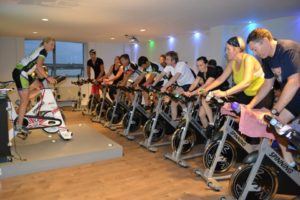Five Training Rules for Busy People
The biggest challenge I encounter with emerging cyclists is their inability to stick to the preparation. This is largely due to their hectic schedules and demand with work, school, family and plain old life. Having ridden for more than 40 years and interviewing other lifelong cyclists, I’ve developed five rules to help busy people become cyclists capable of not just finishing, but truly enjoying the Best Buddies Challenge rides.
Rule One: Get Organized
Have your bike ready to go. When I first ride with a person I’m often alarmed by their level of disorganization. If every time you ride involves several minutes to scour closets and buckets in search of shoes and a helmet, you’ll become discouraged. This organization also includes management of your time, be it the short term of your work week or the long term of your calendar preparation from day one all the way to the big day. Part of this longer term organization includes setting goals and celebrating milestones.
Rule Two: Be Flexible
This rule is of particular importance during the winter months when weather and darkness can constrain your outdoor training options. Too many beginners build hard-and-fast schedules and timetables only to be discouraged by those elements of weather and light and workload. I try to plan in 10-day chunks that include indoor training for those bad weather days or schedule obligations. Adding in equipment like good rain gear, cold weather clothing, and lights can vastly enhance your training options.
Rule Three: Diversify
I chant a mantra that most pros repeat: “Ride More; Train Less.” The most common mistake is to bring a treadmill mentality to bicycling. The best thing about cycling is how many different ways you can enjoy the activity. By “Riding More” I stress the need to ride for utility (shopping, commuting, etc.) and pleasure, which means recreational touring or simply riding for coffee, ice cream, dining, etc. And no, we need not wear Lycra every time we ride. Those miles are just as important during rest cycles.
While I state “Train Less,” we still must train. Training should be mixed between endurance and intensity. Integration of strength training – which may include everything from weights to gym work to cross training to yoga – is equally important, especially for middle age riders. Don’t forget to mix in walking, dancing and other physical activities that bring you joy!
Rule Four: Rest
While our society gives enormous attention to cardiovascular fitness and/or weight loss, we focus little on the musculoskeletal health. Be careful not to use a Tour de France pro or even a regional hot shot as your benchmark for training. The key to this process is rest. For every rider I encounter that is under-trained, I encounter another that has failed to allow their body to recover and reap the benefits of the riding and training they have done. Failure to properly rest will either leave you physically flat, psychologically discouraged or worse, injured.
Rule Five: Don’t Go it Alone
Finding a riding partner or group ride is a key to success. While the metrics of fitness are tremendously important research confirms that being outside with a group is just as important. Busy people are often drawn to the countless “dawn patrol” rides out of assorted coffee shops worldwide. With the advent of Daylight Savings Time, you can find countless club rides in your area that cater to a variety of skill levels. If that seems daunting, recruit just a single person to join you on this journey. Having a riding buddy makes a big difference. They get you out, push you farther, and make you fitter. After all, this IS the Best Buddies Challenge.
 Richard Fries is the Director of Cycling Experience for the Best Buddies Challenges. With more than 40 years experience, he has been a racer, commuter, tourist, promoter, advocate, journalist and commentator on the sport and lifestyle of cycling. Having raced at the professional level both in America and Europe, Fries is well known as a race announcer having called countless USA Cycling National Championships, World Cups, and UCI World Championships. But he is also a tireless advocate having recently served as the executive director of MassBike. You can follow him on Strava to learn more.
Richard Fries is the Director of Cycling Experience for the Best Buddies Challenges. With more than 40 years experience, he has been a racer, commuter, tourist, promoter, advocate, journalist and commentator on the sport and lifestyle of cycling. Having raced at the professional level both in America and Europe, Fries is well known as a race announcer having called countless USA Cycling National Championships, World Cups, and UCI World Championships. But he is also a tireless advocate having recently served as the executive director of MassBike. You can follow him on Strava to learn more.





